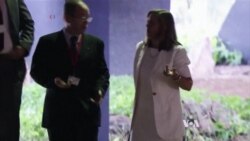The United States and Cuba resume talks this week on the steps needed for re-opening embassies and fully re-establishing diplomatic relations after a break of more than 50 years.
Roberta Jacobson, the U.S. Assistant Secretary of State for Western Hemisphere Affairs, will sit down for talks on Thursday with Josefina Vidal, Cuba’s top diplomat for U.S. affairs. The last round of talks led by the two top negotiators took place in Havana in March.
Talks on re-opening embassies show the two sides have made significant diplomatic progress, says Arturo Valenzuela, a professor at Georgetown University who was Jacobson’s predecessor as assistant secretary of state.
“Having observed this process very closely over the last few years, I think this is clearly an important step,” said Valenzuela.
“This is a way in which both countries can have a much deeper dialogue, despite the fact that, of course, both countries will still have some significant differences,” he added.
He predicted President Barack Obama would tap an experienced diplomat as ambassador to Cuba.
“It is much more likely that the post will go to a career foreign service officer. There are some outstanding career foreign service officers, including some who have extensive experience in dealing with Cuba,” said Valenzuela.
Thursday’s talks will be the first high-level engagement between the two countries since President Obama and Cuban President Raul Castro met during the April Summit of the Americas in Panama.
Both sides are anxious for more progress, said American University Latin American politics professor William LeoGrande.
“I think it is possible that we may get an announcement for the date for opening embassies at the end of the negotiating session that is coming up this week,” said LeoGrande.
The U.S. Congress has until May 29 to weigh in on President Obama’s decision to remove Cuba from the State Sponsor of Terrorism list.
LeoGrande said Cuban leader Raul Castro has indicated his readiness to discuss appointing ambassadors as soon as the deadline expires.
“He said as soon as Cuba comes off the terrorism list, we will be able to exchange ambassadors, implying that the other issues have really been resolved,” said LeoGrande.
One of the big challenges going forward will be maintaining open channels of communications on both sides, said Ambassador Thomas Pickering, a former Under Secretary of State for Political Affairs.
“The access is necessary to talk to the Cubans quite frankly about the things that we object to and they will have the same access to talk to us. It isn’t a one-way street,” said Pickering.
He said negotiators will need to craft a diplomatic package that will withstand scrutiny and be accepted by the American people as a strong and reasonable basis for re-establishing ties.





